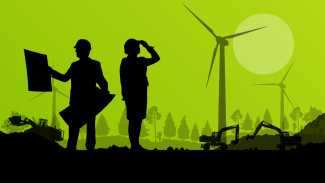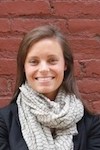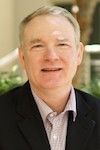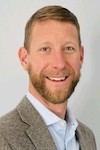Michigan Ross Alums Share How They’re Creating a More Sustainable World

Businesses are paying new attention to sustainability issues, with changes visible in everything from public statements to corporate reporting to hiring.
We asked some Ross School of Business alumni what they’re doing at work to address one or more of the three pillars of sustainability — environmental, economic, and social. Here are their responses:
Bruno Antunes, MBA ’11
Global Sustainability Senior Transformation Manager
Boston Consulting Group, Washington, D.C.
 I’m currently responsible for structuring and driving BCG’s Carbon Reduction Program, a critical pillar of the firm’s net-zero strategy, in close partnership with our regions, offices, practice areas, global functions, and business units.
I’m currently responsible for structuring and driving BCG’s Carbon Reduction Program, a critical pillar of the firm’s net-zero strategy, in close partnership with our regions, offices, practice areas, global functions, and business units.
In September 2020, we announced a bold commitment to achieve net-zero climate impact by 2030, and, from there, to become climate positive, removing more carbon from the atmosphere than we emit each year. A year later, we have taken our climate commitment to the next level by setting science-based targets – aiming to halve our emissions intensity by 2025 (against our 2018 baseline) – which positions BCG among the climate action leaders.
Climate action is one of our most urgent challenges. It will require a rapid transition to a low-carbon economy, as well as the scaling of technologies and projects that will reduce emissions and remove CO2 from the atmosphere. As we partner with our clients to help them in their sustainability and climate ambitions, we must also walk the talk and lead by example, changing and improving the way we operate as a firm. Our net-zero program and the investments we are committed to make in climate action are evidence of the impact we are determined to have across governments, industries, NGOs, and coalitions.
Alicia Chin, MBA ’14
Senior Manager, Sustainability and Social Impact
Smartwool, a VF Company, Denver, Colorado
 Throughout my career, I have worked for a number of consumer-facing companies and get such joy by being able to embed sustainability directly into a product or experience by working across the entire value chain. Currently at Smartwool, an outdoor apparel company, I am working with our wool growers to adopt regenerative practices so that the wool we use will actually benefit the planet. We are also working on developing a circular business model to extend the life of our products. We can create a more sustainable world by creating new things out of nothing new.
Throughout my career, I have worked for a number of consumer-facing companies and get such joy by being able to embed sustainability directly into a product or experience by working across the entire value chain. Currently at Smartwool, an outdoor apparel company, I am working with our wool growers to adopt regenerative practices so that the wool we use will actually benefit the planet. We are also working on developing a circular business model to extend the life of our products. We can create a more sustainable world by creating new things out of nothing new.
Another part of my job that I am incredibly passionate about is ensuring that everyone has access to the outdoors. Living in Colorado, I am fortunate to hike, ski, kayak, or even just go for a walk in some of the most beautiful places in the world. But not everyone has that opportunity. Systemic racism has left a long-lasting legacy preventing many communities of color from simply being able to breathe fresh air, drink clean water, and enjoy the shade of a tree. At Smartwool, I aim for everyone to have a sense of belonging in the outdoors — from making sure our marketing is representative of the community at large to partnering with advocacy groups to ensure that marginalized communities feel safe hitting the trails or the slopes. In my role, sustainability, inclusion, and advocacy all support one another; they are not mutually exclusive. The work that I do to protect and improve the environment is most meaningful if everyone can live a healthy, thriving life outside.
Devon Douglas Leahy, MBA/MS ’09
VP, Sustainability
Ralph Lauren, New York, New York
 At Ralph Lauren, I lead the development and operationalization of our sustainability goals and strategies. From committing to net-zero emissions by 2040 to developing more circular products with Cradle to Cradle certification, I'm committed to leveraging the power of the Ralph Lauren brand and business to change the status quo in the fashion industry.
At Ralph Lauren, I lead the development and operationalization of our sustainability goals and strategies. From committing to net-zero emissions by 2040 to developing more circular products with Cradle to Cradle certification, I'm committed to leveraging the power of the Ralph Lauren brand and business to change the status quo in the fashion industry.
Rachel Everett, MBA ’06, BSEE/MSEE ’00
Senior Manager - EU Sustainability, Transportation Execution
Amazon, London, UK
 Studies already show that e-retail is often more sustainable than brick and mortar, but in both cases supply-chain transportation remains a significant carbon contributor. At Amazon, I’m working with an amazing worldwide team to drive us to net-zero carbon by 2040 — leveraging technology and network optimization, as well as packaging innovations to reduce transportation carbon.
Studies already show that e-retail is often more sustainable than brick and mortar, but in both cases supply-chain transportation remains a significant carbon contributor. At Amazon, I’m working with an amazing worldwide team to drive us to net-zero carbon by 2040 — leveraging technology and network optimization, as well as packaging innovations to reduce transportation carbon.
Mindy Gomes Casseres, MBA/MS ’04
Founder
Blue House Sustainability Consulting, Boston, Massachusetts
 I help companies identify their biggest social and environmental risks and build leadership strategies that address those risks. I love working across different sectors. For example, I helped a national restaurant chain launch a low-carbon meals label and am helping a global biotech company advance its strategy to lower the cost of high-impact medicines.
I help companies identify their biggest social and environmental risks and build leadership strategies that address those risks. I love working across different sectors. For example, I helped a national restaurant chain launch a low-carbon meals label and am helping a global biotech company advance its strategy to lower the cost of high-impact medicines.
Sustainability can’t be driven by the corporate sustainability function alone — and there are opportunities to contribute regardless of your role and place in the organization. Identify how your work ties into your company’s sustainability strategy and ask how you can get involved. From responsible sourcing practices in supply chain to changing consumer behavior through marketing campaigns, all business functions can play a role in driving change.
Talitha Haller, BBA ’08
Sustainability Program Manager
Microsoft, Seattle, Washington
 My work focuses on helping Microsoft's suppliers report their greenhouse gas emissions each year. My team is also helping suppliers develop roadmaps to reduce their emissions. Many of these suppliers are small- and medium-sized businesses, which often don't have the resources to focus on environmental sustainability. Microsoft is providing resources to help our suppliers in their sustainability journeys.
My work focuses on helping Microsoft's suppliers report their greenhouse gas emissions each year. My team is also helping suppliers develop roadmaps to reduce their emissions. Many of these suppliers are small- and medium-sized businesses, which often don't have the resources to focus on environmental sustainability. Microsoft is providing resources to help our suppliers in their sustainability journeys.
Additionally, I am a lead with our volunteer-run employee sustainability community, where we aim to make sustainability part of everyone's job.
In your own company, timing is everything: Look ahead at where there may be growth opportunities, determine how you can be better prepared for those opportunities, and pitch your ideas to those with authority. Don't rely on one outcome. Rather, be open minded about how you can contribute. If a specific door does not open, the timing may not be right for that opportunity. Think big, cast a wide net, and doors will open.
Glenn Hoetker, PhD ’01
MBS Foundation Chair, Professor of Strategy, and Director of the Centre for Sustainability and Business
Melbourne Business School, University of Melbourne, Melbourne, Australia
 I founded (in 2019) and direct the Centre for Sustainability and Business at Melbourne Business School. We aim to support an economically and environmentally thriving Australia through research, teaching, and corporate engagement. I’ve been building on the research I did during my PhD by applying it to the challenges of business sustainability.
I founded (in 2019) and direct the Centre for Sustainability and Business at Melbourne Business School. We aim to support an economically and environmentally thriving Australia through research, teaching, and corporate engagement. I’ve been building on the research I did during my PhD by applying it to the challenges of business sustainability.
Léa Karine Jehin, MBA ’12
West Africa Regional Sustainability Program Manager | Cocoa Horizons
Barry Callebaut Group, Abidjan, Côte d'Ivoire, West Africa
 I work for a vertically integrated company in the cocoa and chocolate industry. Our primary raw material is cocoa, which is mainly produced by smallholder farmers, and 80% of the world's production comes from West Africa alone.
I work for a vertically integrated company in the cocoa and chocolate industry. Our primary raw material is cocoa, which is mainly produced by smallholder farmers, and 80% of the world's production comes from West Africa alone.
As the program manager for our sustainability program for the region of Africa, my objective is to ensure that we source sustainable cocoa for our supply chain. In particular, sustainable cocoa is defined by standards of:
- Traceability — understanding where cocoa farms are located and tracing cocoa beans from the farm to our factories.
- Support to smallholder farmer revenues through increased cocoa productivity or diversification of revenues. This is done through training on good agricultural practices, supporting access to farm inputs, and setting up other income-generating activities.
- Protection of human rights, primarily the fight against child labor, by engaging with local communities, sensitization, and supporting children’s access to school.
- Protection of the environment, namely the fight against deforestation and the reduction of the carbon footprint: ensuring cocoa does not come from protected areas, sensitizing farmers, and supporting agroforestry systems.
We work directly with close to 200 cocoa producer cooperatives, and around 170,000 cocoa farmers and their families in Côte d'Ivoire, Ghana, Cameroon, and more recently, Nigeria.
Rashila Kerai, MBA ’04
Head of Group Sustainability
VP Bank AG, Liechtenstein
 I have worked in sustainability my entire career in different sectors and locations, and my work has focused on building the business case for sustainability — finding the risks (and even more important, the opportunities) and developing a strategy to respond. A key factor in achieving the strategy is helping colleagues understand this topic, what we want to achieve, and how this fits with their work. At VP Bank, my role has been to develop a long-term sustainability plan focusing on the most material topics in our operations and our offering. The plan is integrated into the overall group strategy. In addition to working toward achieving the targets in the strategy, we focus on enabling factors including employee awareness, training, communications, and client engagement.
I have worked in sustainability my entire career in different sectors and locations, and my work has focused on building the business case for sustainability — finding the risks (and even more important, the opportunities) and developing a strategy to respond. A key factor in achieving the strategy is helping colleagues understand this topic, what we want to achieve, and how this fits with their work. At VP Bank, my role has been to develop a long-term sustainability plan focusing on the most material topics in our operations and our offering. The plan is integrated into the overall group strategy. In addition to working toward achieving the targets in the strategy, we focus on enabling factors including employee awareness, training, communications, and client engagement.
Sustainability and sustainable investing have now moved into the mainstream, but there is still much to do. Regardless of what function you work in, there is a role for everyone to play to help drive change from within. I talk to many people who want to work in the sustainability teams in their companies because they want to make a difference. My response to them is that you could help make a bigger difference by taking sustainability into account in your work, whether this is in risk management, HR, communications, operations, procurement, or any other department in your company. Everyone can be part of the change, irrespective of which function you work in.
Mark Leo, MBA/MS ’11
Director of Sustainability | Circular Economy
Owens Corning, Charlotte, North Carolina
 I am responsible for a global organization which develops technical and commercial recycling solutions.
I am responsible for a global organization which develops technical and commercial recycling solutions.
Our mission is to build circular economy business models which allow us to keep building materials and other Owens Corning products in the economy indefinitely, even after the end of their useful life.
Josh Mellinger, MBA ’11
Head of Corporate Sustainability
The Scoular Company, Omaha, Nebraska
 As the Leader of Scoular’s Corporate Sustainability Program, I’m leading the development of customized supply chain solutions that support environmental, social, and economic sustainability for food and feed products worldwide.
As the Leader of Scoular’s Corporate Sustainability Program, I’m leading the development of customized supply chain solutions that support environmental, social, and economic sustainability for food and feed products worldwide.
We should all expect the companies we work for to do more in creating sustainable outcomes. Once we realize that we are the people, at those companies that need to do more, we’ll finally be creating change at scale.








